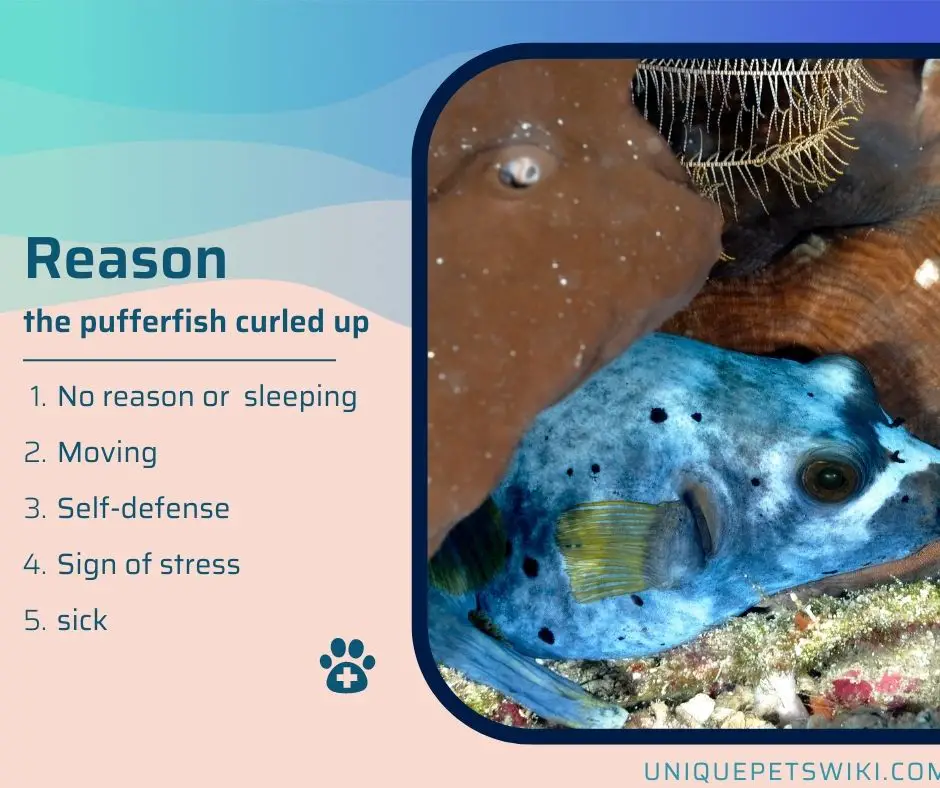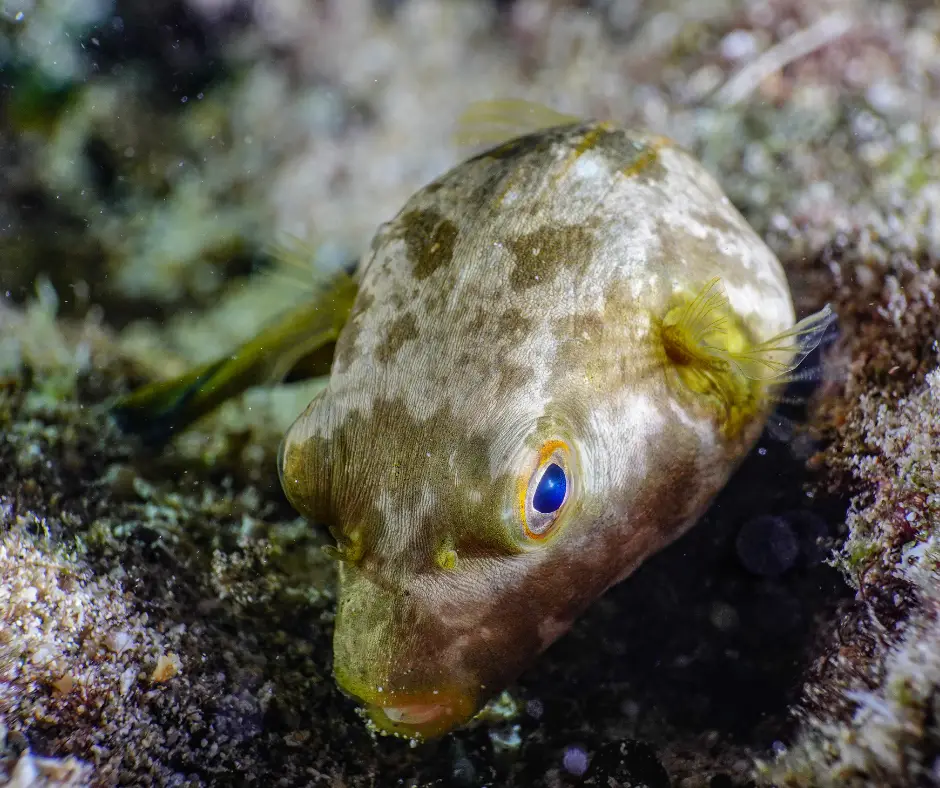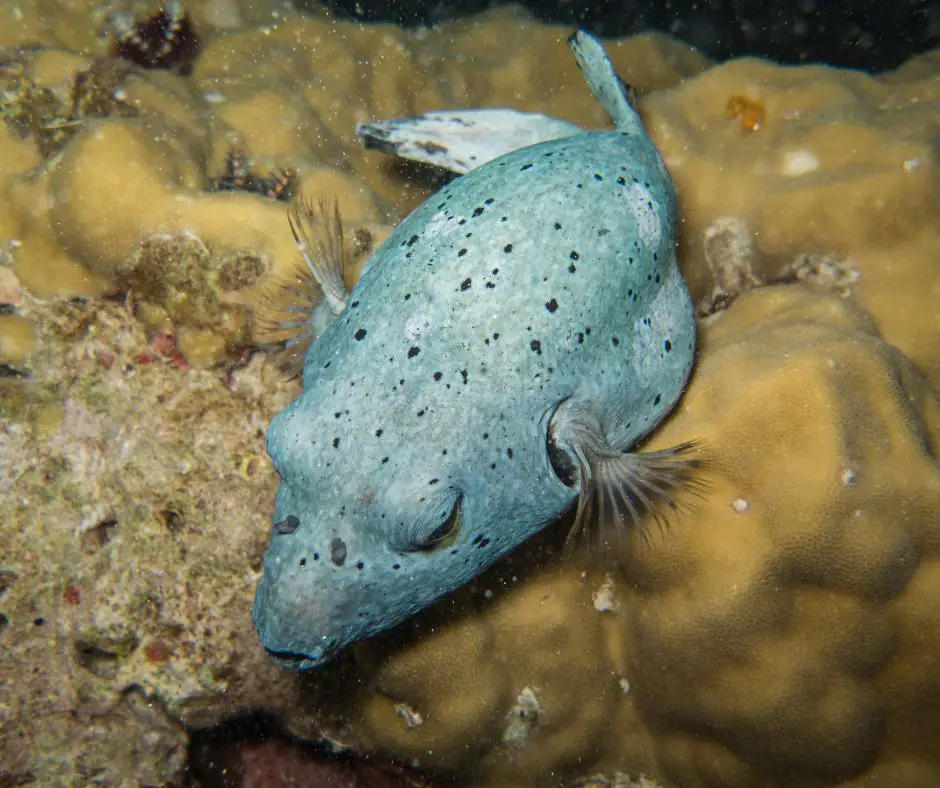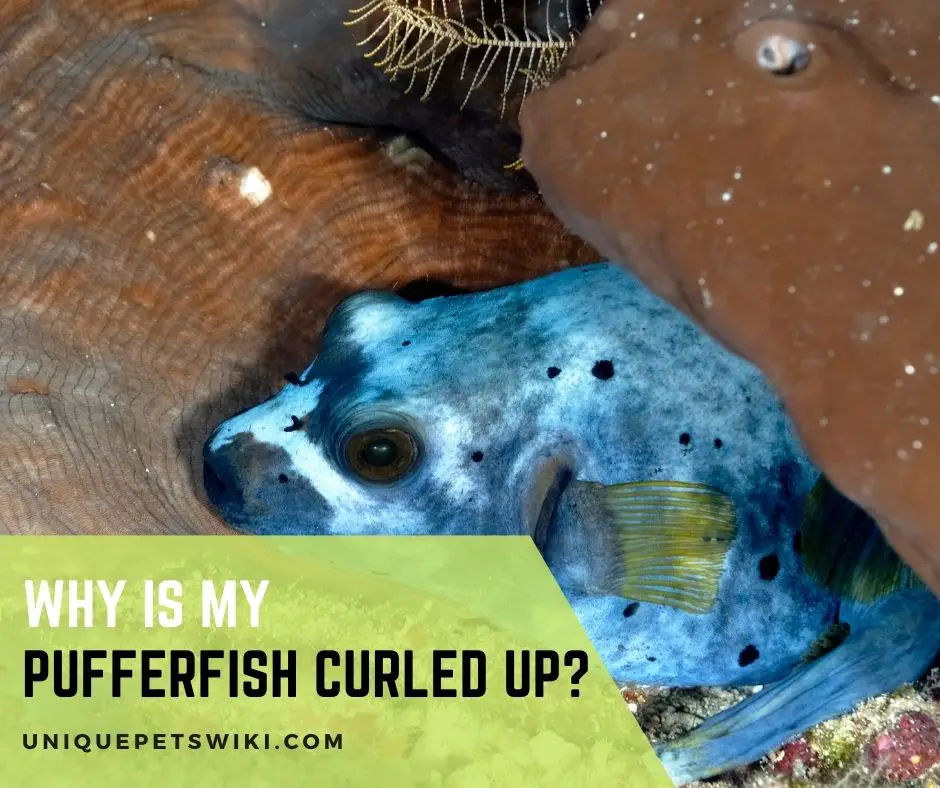Pufferfish are adorable pets found in marine and freshwater environments. They are popularly known for puffing up when threatened to ensure they are not eaten.
Pufferfish also have several other behaviors, and it is best to know everything to help ensure your puffers are in optimal health as a pufferfish owner.
One of the common behaviors that a pufferfish can do is curl up. “Why Is My Puffer Fish Curled Up?” Pufferfish usually curl their tail for several reasons, like when sleeping, sick, distressed, or even without any reason.
This article will highlight everything you need to know about pufferfish curling up, from the reasons they do this to how you can prevent it.
Contents
Why Is My Puffer Fish Curled Up?
Pufferfish can curl up due to several reasons, like when stressed, sick, or just sleeping. You don’t have to worry if your pufferfish is feeding well and has good color.
However, your pufferfish may be sick or afraid if you notice that they curve in a deep U shape.

No Reason or When Sleeping
Like conventional pets such as cats and dogs, pufferfish can curl their tails against their bodies as a defensive measure when sleeping or if they are not feeling well.
You can easily detect when your pufferfish is sleeping with the following signs:
- Your pufferfish lay motionless at the tank bottom or close to the water surface.
- The pufferfish respond slowly to things happening around them and breathe slowly.
- Your pufferfish has a very light color.
Note: It is recommended that you don’t wake your pufferfish if it is in this situation.
Moving
It is common for pufferfish to use their tail as a rudder for propulsion when they want to move fast. When swimming, you can see a puffer fish curl up from side to side to change directions and curl to turn.
Therefore, pufferfish curling up when swimming is natural, and you don’t have to worry.
Self-Defense
Pufferfish have several mechanisms that they use for self-defense, and the most popular one is to puff up.
You can also see your pufferfish curling up when threatened, and they use curling up as a rudder to help back up from danger whenever they are spooked.
You can also see your pufferfish curling their tails in a striking pose whenever they want to attack their food.
It is best that you remove anything that can threaten your pufferfish from the tank once you notice that your pufferfish is curling up as self-defense.
Sign of Stress

A common way to determine that your puffer fish is stressed is if it curls up. You will notice as your puffer fish curls up in its hideout to help get past the stress. This is a common occurrence if you just change the water in their tank.
Other signs that will help you know a stressed puffer fish include:
- Puffing up
- changes in its belly color or the belly is not fat.
- swims around the tank aimlessly.
- Pacing up and down regularly
- loss of appetite
You don’t really have to worry if your puffer fish is curling up after the water changes as long as they get back to normal the next day.
However, you may need to check the water parameter if your puffer fish condition does not change after the next day.
Sick
Another reason for pufferfish to curl up is due to health problems. Sometimes, pufferfish can have a bent back, and a twisted or bent spine causes this.
Furthermore, pufferfish can curl up due to vitamin deficiency in their diet.
Vitamin deficiency in pufferfish usually happens if you are feeding your pufferfish softer foods. Most soft foods usually have an enzyme called thiaminases which destroys vitamin B in the pufferfish body.
Apart from curling up, some of the signs to detect that a pufferfish is sick are:
- Fin rots
- Your puffer fish puffs up frequently.
- Loss of pigmentation on your pufferfish body.
- Sunken or cloudy eyes
- Your pufferfish is always hiding.
- Lack of appetite
- Swollen gills
- Your pufferfish floats lethargically.
The good news is that most diseases in pufferfish are treatable if you detect signs of health problems early. All you need is to determine the cause of a health problem before you can treat it.
However, most health problems in pufferfish can be prevented if you house them in a suitable tank with ideal water parameters and feed them with varied diets.
API FRESHWATER MASTER TEST KIT 800-Test
- Contains one (1) API FRESHWATER MASTER TEST KIT 800-Test Freshwater Aquarium Water Master Test Kit, including 7 bottles of testing solutions, 1 color card and 4 glass tubes with cap
- Helps monitor water quality and prevent invisible water problems that can be harmful to fish and cause fish loss
- Accurately monitors 5 most vital water parameters levels in freshwater aquariums: pH, high range pH, ammonia, nitrite, nitrate
- Designed for use in freshwater aquariums only
- Use for weekly monitoring and when water or fish problems appear
Last update on 2022-12-30 / Affiliate links / Images from Amazon Product Advertising API
Is Puffer Fish Curled Up a Bad Thing?
Generally, pufferfish curling up does not mean that it is dying or anything. Curling up in pufferfish usually occurs due to several reasons. However, it may indicate that your pufferfish is sick in some cases.
Therefore, it is recommended that you keep an eye on your pufferfish to help observe sickness symptoms quickly.
You should also keep an eye on the tank and water parameters to help ensure your pufferfish are not stressed.

Wrapping Up
Curling is a common behavior that you can notice from your pufferfish. Curling up is not a sure indicator that your pufferfish is sick as they do this due to several reasons ranging from sleeping to being sick.
You can do nothing to stop this unless your pufferfish is sick or stressed.
You can then keep an eye on your pufferfish to determine what causes the sickness or stress and try to remove the stress factor immediately.

